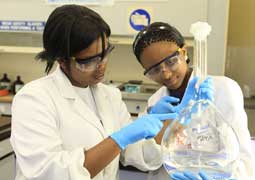
The Council for Scientific and Industrial Research (CSIR) presented its Shareholder’s Compact (performance agreement between the CSIR and Minister of Science and Technology, Ms Naledi Pandor) to the Select Committee on Communications and Public Enterprises, which stipulates its key performance areas and its partnership with state-owned enterprises to realise the aspirations of our country’s developmental agenda through science and technology.
According to its CEO, Dr Thulani Dlamini, the CSIR seeks to strengthen its research outputs to promote human capital development – and to foster scientific and industrial development. “We utilise multi-disciplinary research and technological innovation to foster industrial and scientific development to contribute to the improvement of the quality of life of the people of the Republic of South Africa.
“How do we live up to this mandate, we do so by harnessing our strategy to build strong capabilities and world leaders in certain scientific and technological areas and to attract investment to conduct the cutting-edge research expected of us. The CSIR’s value proposition hinges on the development of a pool of PhD candidates to improve its quality of research outputs and to incept new areas of research.
“We have developed new patents from which we derive royalties and licence income. In this regard, we intend to grow chief researchers, and to have a higher level of research outputs that are relevant. Much of which will be aligned with our industrial development initiatives. Our key performance Indicator is to create a balance between scientific development in areas such as safety and security, health, energy and to support the government’s industrial agenda by working with state-owned companies to develop flagships for innovation,” he said.
The CSIR seeks to leverage strategic partnerships with government entities, education institutions state-owned companies and the private sector. The CSIR has to date intervened in addressing the fragmentation of the health information system which will help the department to migrate to the NHI (National Health Insurance), he said.
“We have developed a health normative standards framework for eHealth Interoperability and Health Patient Registration System, whose framework was gazetted on 23 April 2014. And has now been implemented in 1 859 clinics across the country, with 6.3 million patient registrations recorded.”
We can also be accredited for transforming the industries that support our Defence Force. Through our intervention, we have capacitated black-owned enterprises in this highly technologised sector to be suppliers to the defence sector, he said.
We have developed a technology for water treatment project in Motetema in Limpopo that is highly efficient and easy to set up, he said. “This treatment plant uses a specific algae species, which have been isolated and cultured in a laboratory. Water is a scarce resource in this country and through technology we can address this challenge.”
We also have a strategic relationship and bi-laterals with state-owned entities such as Transnet and Denel. With Transnet, we have developed a Trans-Africa locomotive, and a joint engineering centre for it is going to be established. And together with Denel, we are looking at upgrading the Rooivalk (an attack helicopter manufactured by Denel), he said.
“How many African scientists you have developed who now represent quality? You talked of transformation and equity, is there any tangible evidence of such?” asked a member of the Committee, Mr Phello Parkies.
Dr Dlamini replied: “We don’t have the actual figures now, but the transformation of this sector is one of our main agendas. But I can assure the Members that 60% of our science, engineering and technology component is African. We have not been able to facilitate their progression into leadership positions, and as a result we have been struggling to retain them. Now we have a strategy in place to address that.”
“Are you involved in agricultural research as well?” asked another member, Ms Zukiswa Ncitha. The Group Executive of Research and Development, Dr Molefi Motuku, replied: “The Agricultural Parks’ business plan was done by us.”
Dr Dlamini chipped in: “We were involved with the department in the genetic modification of crops to be drought-resistant. We bring complementary capabilities when needed.”
“You mentioned your involvement in safety and security, what is your role in this regard?” Ms Ncitha asked again.
Dr Motuku replied: “We are engaged with the South African Police Service on certain areas such as crowd control and finger printing to improve their effectiveness in these areas.”
The Chairperson of the Committee, Ms Ellen Prins, wanted to know if the CSIR is involved in research on the prevalence of drought in our country.
Dr Dlamini replied: “We will get an expert advice in this regard, or see how we can intervene in this worrisome matter.”
By Abel Mputing
28 June 2017

